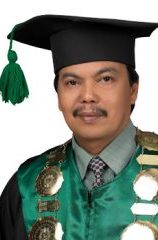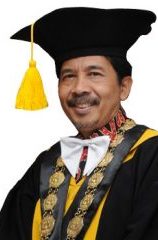The early modern Universities established in the Muslim World having been in Ottoman Turkey in the mid-18th century with the overall thrust since has been a concerted struggle to reconcile and transform Islamic learning by emphasising rational inquiry and modern science.
There were no Universities in Indonesia at the time of independence in 1945 with a literacy rate amongst Indonesians at fewer than 10 percent. Thus, development of both Islamic and secular education systems is one of the finest triumphs of postcolonial Indonesia.
Indonesia practices one of the most liberal forms of Islam in the world while having a secular government and Constitution, with full rights for Christians, Hindus, Buddhists and other religious minorities.
Thus, the Indonesian Islamic higher education system is embedded in a much older metaphysical and philosophical discourse about knowledge and jurisdiction, with many religious thinkers and theologians down through the ages concerned with and seeking to distinguish the relationship between revelation and reason that have framed the historical monotheisms of Judaism, Christianity and Islam.
Even prior to that these deliberations, which stemmed from the clashing of Hellenistic, and Abrahamic traditions that foreshadows the births of both Christianity and Islam by many centuries and that were principally concerned with the central questions about reason and revelation and their place in the monotheistic creeds.
It should come as no surprise then that these issues juxtaposing reason and revelation and science and religion are questioned in the modern Indonesian Islamic education system. With many Higher Education institutions having transformed exclusively religiously orientated institutions into full-fledged Universities, many having adding non-religious departments, encompassing science, technology, health and science faculties.
Today, Indonesian State Islamic Colleges and Universities are playing a key role in the debates about the future of Islam in Indonesia and educate 18 percent of all public University students.
In the official nomenclature, the Indonesian Islamic system is called the PTAIN (State Islamic Higher Education.) Amongst which there are three types of institutions. The smallest of these being the Sekolah Tinggi Agama Islam (STAIN) which are college-level institutions, the mid-sized campuses called Institute Agama Islam Negeri (IAIN) and the largest comprised of the fully fledged Universities Islam Negeri (UIM Islamic state Universities) who have added non-religious faculties.
All three STAIN, IAIN and UIN institutions falling under the auspices of the Ministry of Religious Affairs (MORA) where Rectors of each campus report to the Directorate of Islamic Higher Education – which oversees 35 IAIN’s and monitors and regulates approximately 500 private institutions throughout Indonesia’s archipelago.
Comprising 16 State Islamic Universities (UIN) 12 State Islamic Institutes (IAIN), 32 Islamic Schools of Higher Learning (STAIN), and 461 Private Islamic Schools of Higher Learning (PTAIS), offering hundreds of study programs. So in addition to offering Islamic study, the schools are also now offering a surfeit of general study programs, such as medicine, economics, science and technology, sociology and endless other disciplines.
With oversight provided by the Directorate of Islamic Higher Education in MORA having evolved into an accreditation process as opposed to the top-down direct government design of curricula and teaching methods as used in Saudi Arabia or neighbouring Malaysia.
Each campus and course director still has high autonomy in both the teaching and learning process. With general subjects being by definition non-religious such as in the sciences, mathematics, history, sociology, language and arts.
IAIN faculties have become critical to understanding the Indonesian Islamic academic community. And for their cultural brokerage with Western scholarship, this system having become pivotal to the critical re-examination of Islam and serving as a bridge between the varied strains of Islam, their students having been drawn from heterodox Muslim cultures.
There is no lack of argument about what Indonesian Islamic higher education should be and how best to achieve its aims. The State Islamic Universities, or UIN, having taken on secular subjects, so in substantial sense arguments about higher education in Indonesia have become the fulcrum of the overall nature of Islam in Indonesian society more broadly. Such as, the re-examination of elements of Islamic law that dictate relations between Muslims and non-Muslims, the structure of government and even the proper aims conduct of warfare.
The Rectors of many of the State Islamic Universities in Indonesia having recognised the need to encourage on-going Islamic education reform, whilst secularists critics both within and outside the Indonesian Muslim community having argued they are not adequate as education institutions and apprehensive that they were failing to provide an adequate education, and are mostly incapable of producing the graduates capable of contributing to the much-needed reform within Indonesia.
These cultural and social changes having occurred alongside Indonesia’s political and economic development and modernisation, all of which should do more to influence the overall education system. So whilst Islamic Higher Education institutions cannot escape such evolution, they remain dependent upon their own willingness to reform.
Having often wallowed in nostalgia that has left them unable to grapple with the many problems facing the Indonesian ummah (community of believers) today.
The greatest peril for domestic education institutions comes from within if these institutions are to remain resistant to modernisation and nostalgic for their historical achievements, the fear is always that they will become marginalised and irrelevant to Indonesia’s mainstream.
Yet adapting to the shifting social currents is far from an easy task. With Islamic tertiary education having to maintain their original mission and character as religious-based education institutions, whilst having to grapple with the changing social climate by modernising their curricula.
The paradox they face by creating this accommodation is the relative reduction in hours devoted to religious studies. Resulting in them becoming less relevant as institutions established to provide religious education. So in trying to adopt more “western style” of educative norms and practices only presents a dilemma for these institutions.
Given that the Western world is largely secular in outlook and practice. Allowing the private practice of religion but not accepting revealed truths as the basis for understanding and organising society, thus religion having been mostly marginalised in Western definitions of progress. Revelation having been replaced by rationalism as the source of all truth, and the God-centred view of the world has been replaced by an anthropomorphic view of a world where man creates ever changing and conflicting values and norms by which to live.
From a western perspective then it is essential to understand that Islam provides a holistic approach to human society. One in which economic growth and material advancement are thought essential, but are framed by Islamic humanitarianism and an Islamic sense of social justice.
Education is therefore crucial in preparing young Indonesian to contribute to a global future. This is no less true of Islamic forms of education as evidenced by the Indonesian Islamic Universities that have shown their capacity to move with the times without sacrificing or foregoing their Islamic identity.



